The Violent Criminal Actor & Being Too Nice
Nathan Wagar
One of the biggest mistakes I have seen people make is that they feel the need to follow social norms even when faced with deviant behavior. You may have seen this yourself. Someone is walking down the street, he may or may not feel comfortable in his surroundings, and a group with obviously less than honorable intentions calls out to him as he walks.
Some people will actually walk up to them as though the group were actually asking for help or wanting to have a pleasant chat. It’s not that the person doesn’t know better, it’s simply that we get scared and stick to the script of normal polite social interaction, and hope that it saves us by virtue of being polite. People in civilized society naturally want social interaction, and social interaction brings its own obligations and expected norms of behavior to the exchange.1) See the entirety of Erving Goffman, The Presentation of Self in Everyday Life (New York: Doubleday Anchor, 1959) (London: Allen Lane, 1969); and Roger C. Schank and Abelson, Robert P., Scripts, Plans, Goals, and Understanding: An Inquiry Into Human Knowledge Structures (Hillsdale: Lawrence Eribaum Associates Inc., Publishers, 1977), 36-67.
Someone with malicious intent will knowingly manipulate these social expectations of an interaction, and this is why directly calling out to a potential victim is so common. We think we are above this, but we are ultimately evolved chimpanzees with a powerful evolutionary urge to obey these norms, sometimes to our immediate detriment.
Evolution is good for the species; nobody said it had to be good for you.
So what is the main problem here? Well, on the one hand, ignoring someone that is part of a status-based subculture in a run-down part of town is likely to get you accosted. However, inviting social interaction and further progressing the connection is placing the ball in their court.
In fact, attempting to terminate the interaction at that point, to say “Oh shit, well these guys are making me too nervous,” could invite an excuse for escalation. After all, who do you think you are? You talked to them, and now you are violating the rules by walking away from them just for talking to you? What’s your problem? Sure, they are using the system against you. Sure, it’s a manipulative guilt trip.
And it works.
It works a lot more than people think, and it works with people that would swear up and down that it wouldn’t work on them. At the end of the day, most people don’t want to look like a dick. They may in fact be a dick, but the importance of not looking like one is the critical factor for social creatures.
A movie with a scene that beautifully illustrates this point is “Training Day,” during the poker scene with Jake Hoyt as played by Ethan Hawke, and the Hillside gang members. Alonso, played by Denzel Washington, is a dirty cop that leaves his partner playing a game of cards with the friendly neighborhood cholos while he supposedly goes to use the bathroom. Unbeknownst to his partner, however, the purpose was for a hit.
Through the course of the game, the gang members alternate between social banter and indirectly intimidating conversation; they ask to see his gun, and he removes the ammunition and lets them hold it. Long story short, he finds himself in a bathtub about to suckstart the end of a shotgun held by a guy named “Smiley.”
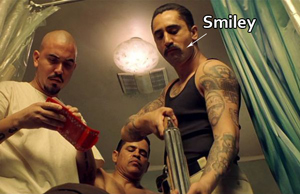
Why the hell would any of that have happened? Any number of reasons. In that world, shaky alliances need to be formed as informants are made and gang members use it to their mutual advantage against other gangs. As a rookie, he expected hazing, and this comes from gang members as well as his own law enforcement officers. Sure, the gang members were being intimidating at times, but that type of joking is common, and there is expected to be a certain back-and-forth between law enforcement and bangers.2)Abby Peterson, “Who ‘Owns’ the Streets? Ritual Performances of Respect and Authority in Interactions Between Young Men and Police Officers,” in Journal of Scandinavian Studies in Criminology and Crime Prevention 9, no. 2 (November 18, 2008): 97-118, accessed September 9, 2017, http://dx.doi.org/10.1080/14043850802450104.
You have to earn your right to be there, regardless of what side of the law you are on, and connections are part of the game being played. If he ruined the relationship with major players early in his career, working narcotics in the grimy parts of Los Angeles was going to be uphill to nowhere.
Not only does he need to establish his own connections, he has a duty not to ruin those of Alonso, his more experienced partner. Alonso obviously knew these guys and was okay with leaving him briefly to use the bathroom. Part of the arc of the movie was how the streets, in a sense, “raised” Ethan’s character because Alonso didn’t properly train him. While Alonso ditched him, Ethan is expected to learn the norms of interaction between gang member connections and Alonso’s team’s more unorthodox policing style. In other circumstances Ethan’s acceptance of the interaction with Smiley may have been relatively fine, but this time it was not.
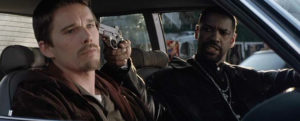
Father Figure
The irony was that Alonso thought he knew the streets, but was in fact overly pessimistic and read the hood wrong, so to speak. Again, Ethan may have been wrong contextually at the poker game, but the movie itself makes the point that his overall view was correct. Now the drama in the movie comes in the twists and turns as the character makes mistakes in the short term but ultimately prevails in the truth of his larger beliefs. We in real life, however, do not have the advantage of a professionally written pre-scripted narrative, and there is no margin for error.
Finally, there is the simple naivete of a man that believed in good and saw it in other people, in this case at higher levels than the situation warranted. There were even women and children present (ironically there to handle money from the hit), and it is plausible to think that the gang members wouldn’t risk violence in front of them.
But this is all the backdrop behind the interaction: in the most fundamental sense, Ethan Hawke was sitting at another man’s table in his own house, playing a game of cards. Ethan accepted the invitation to a social interaction, and then he let the rules of that system and its corresponding “script” dictate his behavioral options, most of which were polite.
You may not have agreed with him accepting it, but the fact is that Alonso already dictated the terms and entered him into the stage. The interaction script was nestled deep down into a chain of decision making: he was in their territory, with Alonso’s contacts, in their home (supposedly to bring food), around their family, in the kitchen, he was offered a drink, and finally at their table, playing a game.
As the critical event gets closer, each script gets narrower and narrower in real time, and the options that seem screamingly obvious to someone on the outside are not only difficult to do, they are difficult to even comprehend. People are unpredictable, but not because we are good at it. Routines, scripts, and patterns are the norm that society itself is based on. By the time Jake recognized that the system was being used against him, he had gone too far down the decision tree in real time, and violence was no longer an option, because he had no weapon.
One of the purposes of writing about a bit of my past in a previous article using a real friend, was to show that Violent Criminal Acts are contextual, as are the Actors who commit them. The scene in “Training Day” was valuable because it showed that even when the gang members were using the social interaction system against Ethan, they were also being affected by it themselves. Smiley was genuinely pissed that he got punched and disrespected in his own house, in front of his friends and family. That wasn’t feigned, that anger was real.
In some sense, the primary thrust of his actions, the one affecting his emotions, was contextual. And the context was a game of poker. This is of course not to say that Jake would have ended up with less of a hole in his face, but that would have been a different category of violence with a different trigger, and therefore different strategies to deal with it. Material gain vs losing face in an honor based subculture. It is conceivable that there were moments back and forth through the poker game where they actually didn’t think Hawke was that bad. The “game” still continued even when Smiley had his money counted; why continue it?
At some point there is always a trigger, and a decision is made and followed through with action.3) Richard Wortley, “Situational Precipitators of Crime,” in Environmental Criminology and Crime Analysis, 2nd ed., eds. Richard Wortley and Michael Townsley (New York, Routledge, 2017), 62-86.As I discussed in the previous article, a Violent Criminal Act is ultimately a system of systems involving context, culture, players, strategies, and moves that take place in real time. If you recognize the “game” you are playing, you dismantle the structure and the violence doesn’t take place. Ethan thought he was playing one game, when in fact he was playing another.
Now many of you probably watched that movie and thought “That cop was retarded, I would never have done X Y Z.” Fair enough, but given the demographic of my readership, it’s safe to say that most of you wouldn’t have been sitting in Echo Park surrounded by cholos to begin with. That doesn’t leave you free of your own situational schemata, however.
One of the reasons I let a domestic shelter coordinator know that teaching physical self defense to the shelter inhabitants would only do so much, is that the situational interaction template was that of a family relationship. There is a whole different set of rules and decision making they follow that is simply out of my realm of expertise. I can teach the wives and mothers the proper response to a shove or a hair grab, but nothing on the planet says that they will use it. Psychological factors, roles, norms, and game rules are powerful forces in outcomes. Ethan probably got taught not to hand his firearm to gang members, but hey. Shit happens.
Men at a bar? Why do they feel the need to get involved in a status based transaction involving posturing and mutual combat? They essentially let themselves get sucked into a game with its own rules and its own “social action script” by responding to the look from the other drunk guy in the corner. Now they feel obligated to perform according to the stage they are playing on. And yet, their larger system of goals and values would not give this person the time of day.
What saves us from allowing various external factors, whether evolutionary or contextual, from involving us in poor systems, is training and acting according to a strategy. Ultimately, this means knowing what your end goals are, and only playing the “mini-games” insofar as they serve your higher system goals, or not at all.
Examples can be multiplied ad infinitum, but try to keep these core concepts in mind:
1. Know your higher, medium, and lower level goals.
In systems theory we would call this macro, meso, and micro. If your goal is to escape, then deescalation should feed into that, not operate as an equally important decision making option.
2. Know the social interaction rules, and how they interact with your own higher system goals.
When in Rome do as the Romans do, but only so long as you both have the same idea of what Rome is. You have obligations to a social context with social people, not with anti social people. This is your new, expanded, higher level system script; it doesn’t replace the others, and indeed most of de-escalation techniques involve using social scripts, but it does provide strategic context.
3. Make sure that each lower level goal and application feeds relentlessly into the one above it; no more, and no less.
This isn’t as easy as it sounds, and often takes training. Even Smiley and the gangsters continued to converse and follow interactional norms for that poker game context, and the trap was already set. It was over; there was no more reason for talk, but interaction scripts are a powerful thing. Most of us are following similar scripts but with different decision options leading to radically different potential outcomes. That’s the scary part: evil is banal, and 99% of it looks like and may even be stuff you already know.
Until it’s not.
Guys like Smiley can afford to play with that deck because it’s already stacked with more wild cards for them; our game of poker can’t.Violence is not an infinite interaction. It takes place in time, chances are often stacked against you, with limited resources and little margin for extraneous effort or error. Train and act accordingly, and remember that respect is a virtue, but niceness is not.
References
| ↑1 | See the entirety of Erving Goffman, The Presentation of Self in Everyday Life (New York: Doubleday Anchor, 1959) (London: Allen Lane, 1969); and Roger C. Schank and Abelson, Robert P., Scripts, Plans, Goals, and Understanding: An Inquiry Into Human Knowledge Structures (Hillsdale: Lawrence Eribaum Associates Inc., Publishers, 1977), 36-67. |
|---|---|
| ↑2 | Abby Peterson, “Who ‘Owns’ the Streets? Ritual Performances of Respect and Authority in Interactions Between Young Men and Police Officers,” in Journal of Scandinavian Studies in Criminology and Crime Prevention 9, no. 2 (November 18, 2008): 97-118, accessed September 9, 2017, http://dx.doi.org/10.1080/14043850802450104. |
| ↑3 | Richard Wortley, “Situational Precipitators of Crime,” in Environmental Criminology and Crime Analysis, 2nd ed., eds. Richard Wortley and Michael Townsley (New York, Routledge, 2017), 62-86. |



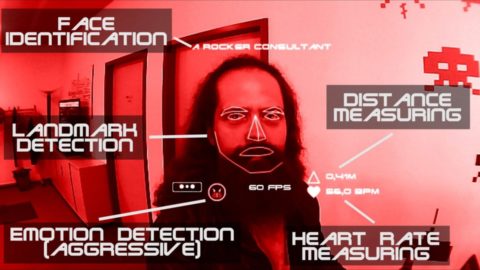
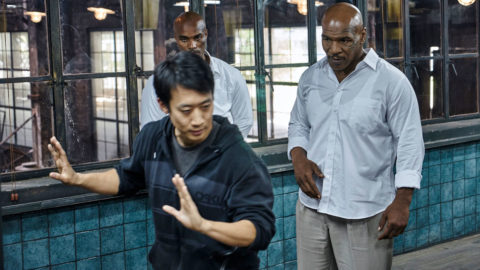
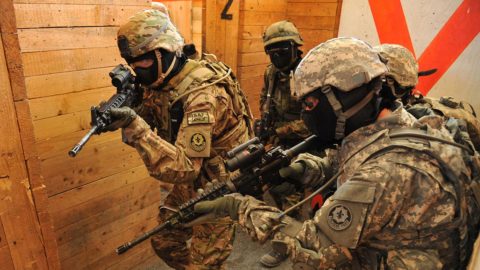

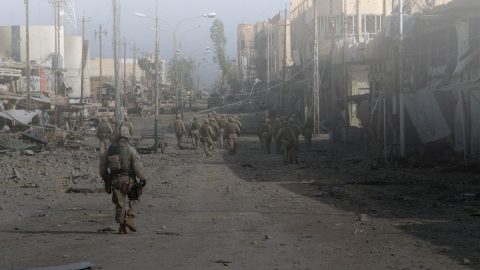
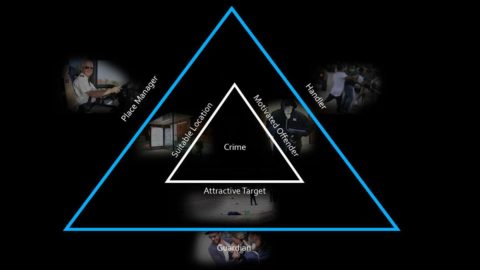

 Rob Brotzman
Rob Brotzman  Nathan Wagar
Nathan Wagar